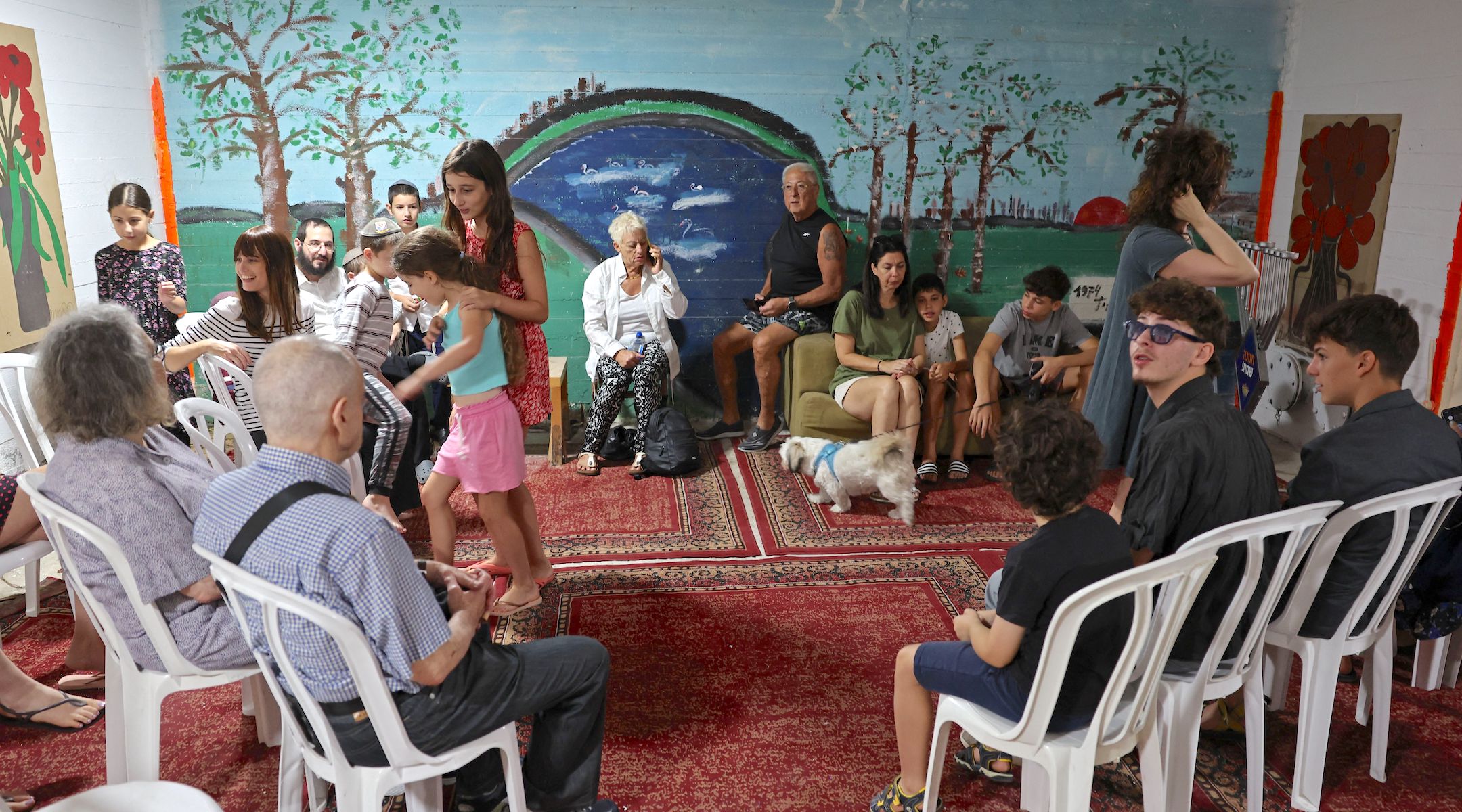JERUSALEM (JTA) — I was chanting from the Torah in synagogue when the first siren went off. It was the morning of Simchat Torah, the holiday celebrating our commitment to read the entire Torah over the course of the year, starting with Genesis and concluding with the final verses in Deuteronomy about Moses’ death: “Moses was 120 years when he died; his eyes were undimmed, and his vigor unabated.” Moses, who wishes more than anything else to enter the promised land, is permitted only to look out at the land from afar, from the top of Mount Nevo, where no one knows, to this day, exactly where he is buried.
I have always been moved and haunted by the pathos of these verses, but never more so than today. I had just concluded Moses’ final blessing to the people of Israel — “Israel dwells in safety, untroubled is Jacob’s abode” — when suddenly no one felt safe in synagogue, where we’d been praying outside in an open courtyard. Quickly we all filed down a narrow staircase to an underground shelter.
“My children — they are home alone,” I thought in panic, because Israel no longer dwelled in safety. We all knew the regulations: Stay in the shelters for 10 minutes after the sirens. Under such conditions, what could we do but continue praying? Three members of the minyan with more presence of mind had carried the Torah scrolls downstairs with them, and so there in the dimly lit shelter, while the sirens continued to wail aboveground, I went on to read the end of Moses’ final blessing: “O happy Israel! Who is like you? A people delivered by the Lord. Your protecting shield, your sword triumphant. Your enemies shall come cringing before you.”
Who could know, when we chanted those words, that we would spend the rest of the day listening to the thundering of rockets in the air, and the buzz of military helicopters circling overhead?
Finishing the Torah is supposed to be festive and momentous. Under ordinary circumstances, we would dance with the Torah scrolls in circles of men, women and children, singing with full-throated ease. There was no dancing that morning, no circles of joy — everyone was eager to get home safely as soon as possible. When Moses ascends Mount Nevo, God shows him the entire land of Israel: “Gilad as far as Dan, all Naftali, the land of Ephraim and Menashe; the whole land of Judah as far as the Western Sea, the Negev and the Plain.” We still did not know where the sirens were coming from, and which parts of the country were under attack — Gush Dan, where Tel Aviv is located? The Negev? Or the whole land of Judah, including our home in Jerusalem, where my children were alone, no longer untroubled in their abode?
For a moment my voice wavered — how easy it would be to succumb to the emotional heft of the moment, as I read the Torah’s final words. But then I heard the community lifting me up and carrying me forwards: “Strong, strong, may we be strengthened,” they recited, as is traditional upon completing a Torah scroll. “Strong, strong may we be strengthened,” I repeated, my voice this time unwavering.
As soon as the requisite 10 minutes had elapsed, we emerged from the underground shelter and went back out to the synagogue to continue praying. My husband returned home immediately to join our children, but I stayed for the final half hour of the service, which was interrupted by one more siren that sent us down again to the shelter. There we said the prayer, recited each week, for the welfare of the State of Israel and its soldiers “who stand guard over our land and the cities of our God, from the Lebanese border to the Egyptian desert, and from the Great Sea unto the approach of the Aravah, on the land, in the air, and on the sea.” Later that day, looking down from our porch, we would see so many men who would otherwise be observing the sanctity of the day, but instead were getting into their cars in military uniform, driving off to army bases. I was not alive for the Yom Kippur war, but I had read and seen enough to feel chilled by the resonance. Our country was being invaded that very morning by land, by air, by sea. We concluded the silent prayer with the blessing of peace: “May He who makes peace in His universe make peace for us and for the people of Israel.”
This holiday, which in Israel is not just Simchat Torah but also Shmini Atzeret, marks the start of the rainy season. Standing at the front of the shelter, the prayer leader recited the traditional liturgy that the rain should fall “for blessing and not for curse. For life and not for death.” The woman praying behind me in the safe room added in an undertone, “For peace and not for war.” May it be rain, and not rockets, that descend on us in the season ahead. As is customary in our synagogue, we recited a modern feminist version of a liturgical poem about the prayer for rain, which invokes Deborah the judge who led the Israelites in battle against their enemies, and Miriam who watched over her younger brother in the Nile when his life was in danger. I hoped my kids had had the presence of mind to enter the safe room. I hope the older siblings were watching over the younger. I had no idea, back when I will still in synagogue, how terrified the little one would be.
When I returned home — thankfully there were no sirens on the way — and entered our safe room, I found my husband and children huddled together. Our safe room is also the bedroom shared by my youngest daughter and son, their beds covered in stuffed animals and strewn with Curious George books. The room was dark because it was Shabbat and a holiday, when we do not turn on lights. The window was closed and shuttered, because it was a safe room — no “bad guys” could get in, as my 3-year-old son Yitzvi put it, but also no light. Instead the kids were creating their own light, singing all the prayers they knew out loud together. My daughter shifted over to make room for me to sit next to my husband, who whispered in my ear, “They were all in here when I got here, praying, with the doors and windows barred. They knew just what to do.”
I put my finger to my lips and did not ask any questions. I thought about the story of King David, who was told that as long as he kept learning Torah, the angel of death would not be able to snatch his soul away. Somehow Yitzvi had the same intuitions. He didn’t know most of the words to the songs, so he hummed along, and any time the kids paused in between prayers, he shouted out, “Don’t stop davening! Don’t stop! I don’t want the bad guys to come!” Every little sound startled him, and he vomited twice in fear.
My oldest son, who is 12, told his younger siblings to hold their hands in the air. “As long as you hold your hands above your head, Bnei Yisrael will win,” he instructed. It was magical thinking meets biblical allusion. Immediately after the Israelites leave Egypt, they are attacked from behind by the nation of Amalek. “Whenever Moses put up his hand, Israel prevailed, but whenever he let down his hand, Amalek prevailed,” the Torah teaches. But Moses’ hands grew heavy, so his brother and his nephew had to support his hands, keeping them steady “until the sun set.” I thought about how an elderly neighbor had once told me that she loved hearing my kids pray on the porch during the pandemic. “The prayers of young children go straight up to the throne of God’s glory,” she told me from behind her mask. I wanted my children to keep on praying, but my husband and I were there, like Aaron and Hur, to support them when the situation grew too heavy.
My children did not pray steadily until sunset. In between the sirens, we came out of the safe room, played board games, made lunch and tried to ignore the rumbling from over the distant hills. A family from down the block who did not have a safe room in their home joined us, along with two seminary girls who were staying with them for the holiday, and we were 14 people crowded in the safe room for the last three sirens of the day. When we made Havdalah at the end of Shabbat and the holiday, gathered around the braided candle, I recalled how this was the time referred to in Israel as Acharey HaHagim, after the holidays, when school finally resumes after the long holiday break, everyone goes back to their routines and adults can finally work a full uninterrupted week. “Acharey HaHagim Sameach,” people often greet each other cheerily at this time of year — “Happy going back to routine!” I didn’t need to hear the news to know that there would be none of that. Not this year.
JTA has documented Jewish history in real-time for over a century. Keep our journalism strong by joining us in supporting independent, award-winning reporting.







